Terah Lyons
Artificial Intelligence Index Report 2025
Apr 08, 2025Abstract:Welcome to the eighth edition of the AI Index report. The 2025 Index is our most comprehensive to date and arrives at an important moment, as AI's influence across society, the economy, and global governance continues to intensify. New in this year's report are in-depth analyses of the evolving landscape of AI hardware, novel estimates of inference costs, and new analyses of AI publication and patenting trends. We also introduce fresh data on corporate adoption of responsible AI practices, along with expanded coverage of AI's growing role in science and medicine. Since its founding in 2017 as an offshoot of the One Hundred Year Study of Artificial Intelligence, the AI Index has been committed to equipping policymakers, journalists, executives, researchers, and the public with accurate, rigorously validated, and globally sourced data. Our mission has always been to help these stakeholders make better-informed decisions about the development and deployment of AI. In a world where AI is discussed everywhere - from boardrooms to kitchen tables - this mission has never been more essential. The AI Index continues to lead in tracking and interpreting the most critical trends shaping the field - from the shifting geopolitical landscape and the rapid evolution of underlying technologies, to AI's expanding role in business, policymaking, and public life. Longitudinal tracking remains at the heart of our mission. In a domain advancing at breakneck speed, the Index provides essential context - helping us understand where AI stands today, how it got here, and where it may be headed next. Recognized globally as one of the most authoritative resources on artificial intelligence, the AI Index has been cited in major media outlets such as The New York Times, Bloomberg, and The Guardian; referenced in hundreds of academic papers; and used by policymakers and government agencies around the world.
Artificial Intelligence Index Report 2024
May 29, 2024Abstract:The 2024 Index is our most comprehensive to date and arrives at an important moment when AI's influence on society has never been more pronounced. This year, we have broadened our scope to more extensively cover essential trends such as technical advancements in AI, public perceptions of the technology, and the geopolitical dynamics surrounding its development. Featuring more original data than ever before, this edition introduces new estimates on AI training costs, detailed analyses of the responsible AI landscape, and an entirely new chapter dedicated to AI's impact on science and medicine. The AI Index report tracks, collates, distills, and visualizes data related to artificial intelligence (AI). Our mission is to provide unbiased, rigorously vetted, broadly sourced data in order for policymakers, researchers, executives, journalists, and the general public to develop a more thorough and nuanced understanding of the complex field of AI. The AI Index is recognized globally as one of the most credible and authoritative sources for data and insights on artificial intelligence. Previous editions have been cited in major newspapers, including the The New York Times, Bloomberg, and The Guardian, have amassed hundreds of academic citations, and been referenced by high-level policymakers in the United States, the United Kingdom, and the European Union, among other places. This year's edition surpasses all previous ones in size, scale, and scope, reflecting the growing significance that AI is coming to hold in all of our lives.
Artificial Intelligence Index Report 2023
Oct 05, 2023Abstract:Welcome to the sixth edition of the AI Index Report. This year, the report introduces more original data than any previous edition, including a new chapter on AI public opinion, a more thorough technical performance chapter, original analysis about large language and multimodal models, detailed trends in global AI legislation records, a study of the environmental impact of AI systems, and more. The AI Index Report tracks, collates, distills, and visualizes data related to artificial intelligence. Our mission is to provide unbiased, rigorously vetted, broadly sourced data in order for policymakers, researchers, executives, journalists, and the general public to develop a more thorough and nuanced understanding of the complex field of AI. The report aims to be the world's most credible and authoritative source for data and insights about AI.
Gathering Strength, Gathering Storms: The One Hundred Year Study on Artificial Intelligence (AI100) 2021 Study Panel Report
Oct 27, 2022Abstract:In September 2021, the "One Hundred Year Study on Artificial Intelligence" project (AI100) issued the second report of its planned long-term periodic assessment of artificial intelligence (AI) and its impact on society. It was written by a panel of 17 study authors, each of whom is deeply rooted in AI research, chaired by Michael Littman of Brown University. The report, entitled "Gathering Strength, Gathering Storms," answers a set of 14 questions probing critical areas of AI development addressing the major risks and dangers of AI, its effects on society, its public perception and the future of the field. The report concludes that AI has made a major leap from the lab to people's lives in recent years, which increases the urgency to understand its potential negative effects. The questions were developed by the AI100 Standing Committee, chaired by Peter Stone of the University of Texas at Austin, consisting of a group of AI leaders with expertise in computer science, sociology, ethics, economics, and other disciplines.
The AI Index 2022 Annual Report
May 02, 2022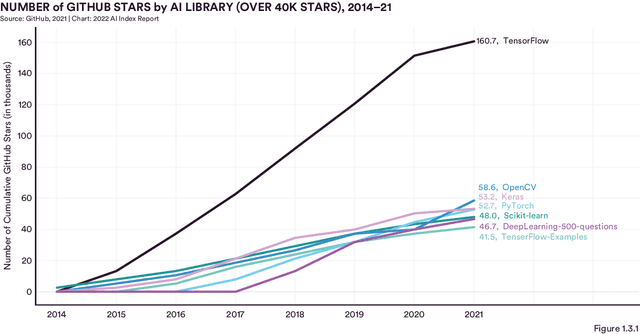
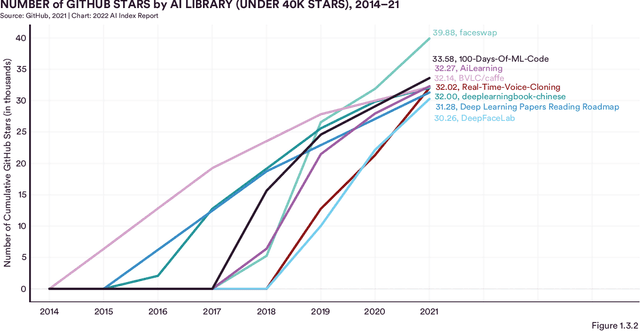
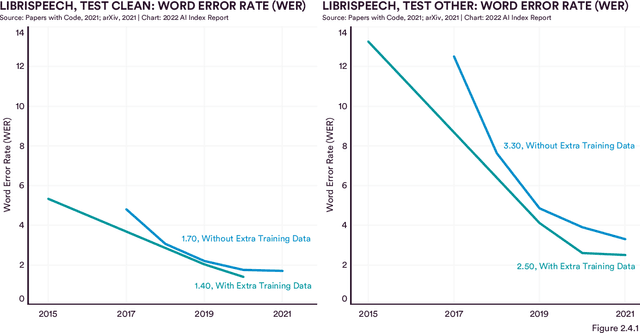
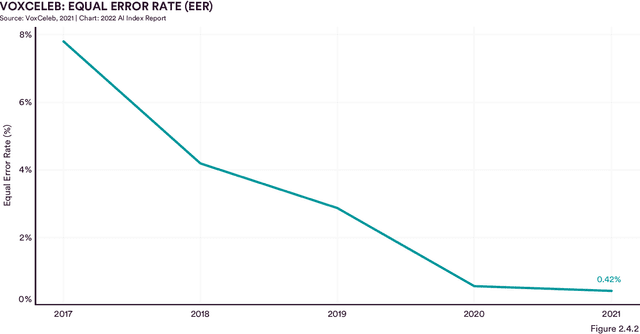
Abstract:Welcome to the fifth edition of the AI Index Report! The latest edition includes data from a broad set of academic, private, and nonprofit organizations as well as more self-collected data and original analysis than any previous editions, including an expanded technical performance chapter, a new survey of robotics researchers around the world, data on global AI legislation records in 25 countries, and a new chapter with an in-depth analysis of technical AI ethics metrics. The AI Index Report tracks, collates, distills, and visualizes data related to artificial intelligence. Its mission is to provide unbiased, rigorously vetted, and globally sourced data for policymakers, researchers, executives, journalists, and the general public to develop a more thorough and nuanced understanding of the complex field of AI. The report aims to be the world's most credible and authoritative source for data and insights about AI.
The AI Index 2021 Annual Report
Mar 09, 2021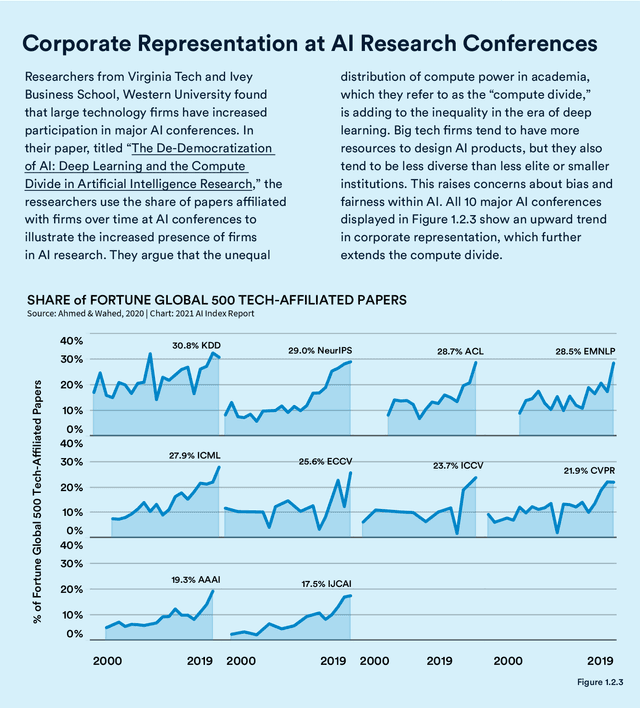
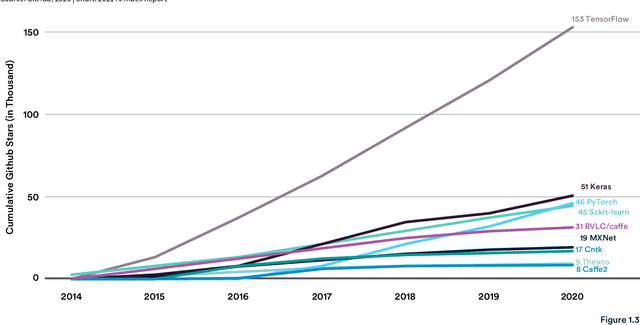
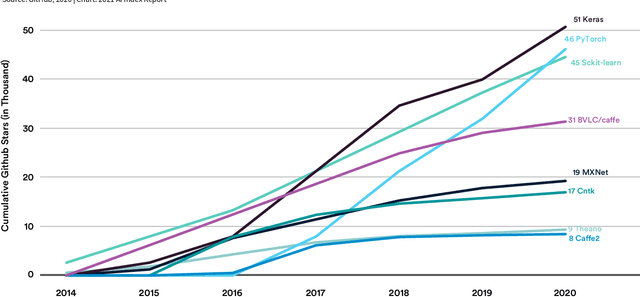
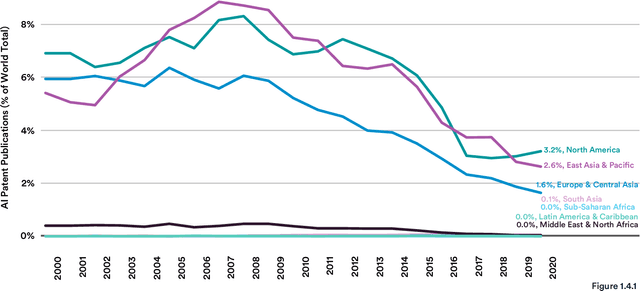
Abstract:Welcome to the fourth edition of the AI Index Report. This year we significantly expanded the amount of data available in the report, worked with a broader set of external organizations to calibrate our data, and deepened our connections with the Stanford Institute for Human-Centered Artificial Intelligence (HAI). The AI Index Report tracks, collates, distills, and visualizes data related to artificial intelligence. Its mission is to provide unbiased, rigorously vetted, and globally sourced data for policymakers, researchers, executives, journalists, and the general public to develop intuitions about the complex field of AI. The report aims to be the most credible and authoritative source for data and insights about AI in the world.
 Add to Chrome
Add to Chrome Add to Firefox
Add to Firefox Add to Edge
Add to Edge